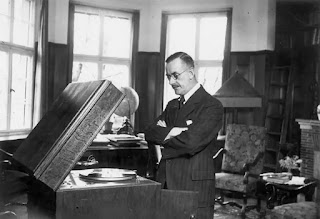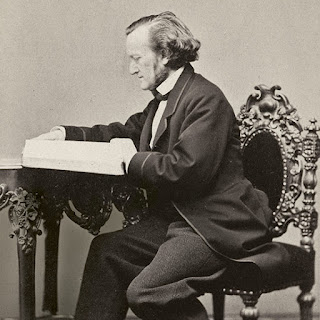For a figure as towering as Thomas Mann, it might seem reductive to pinpoint a singular wellspring of his creative genius. Yet, as a recent article by Gvantsa Ghvinjilia, published in Dramaturgias, incisively illustrates, the spectral, charismatic influence of Richard Wagner permeates Mann's oeuvre, shaping not merely individual characteristics but the very architecture of his artistic thought. Indeed, the paper posits Mann as arguably "the writer most obsessed with music," and particularly with the Master of Bayreuth.
Ghvinjilia's research meticulously unpacks the multifaceted ways Wagner’s musical and dramatic innovations, as well as his essays, resonated within Mann’s literary universe. It was an influence so profound that Mann himself acknowledged living "in [Wagner's] shadow". This was not a passive reception but an active engagement that led to a unique genre model in Mann's hands – the "anti-novel" – directly inspired by Wagner's musical dramas.
The stylistic and formative elements of Wagner’s music clearly left an indelible mark. Take, for instance, the dominance of inner spiritual processes in Wagner's dramas; this served as a wellspring for Mann's development of inner dialogue and narrative internalization in his own novels. Moreover, Wagner’s revolutionary leitmotif system, which assigned symbolic musical phrases to characters, ideas, and even abstract concepts, profoundly influenced Mann’s technique of associative connections, leading to "leitcharacters" and "leitconcepts" in his works. Mann himself stated that his novels were a "symphony, a contrapuntal work, a network of themes in which ideas play the role of musical motifs," directly echoing Wagnerian principles.This musicality is particularly evident in The Magic Mountain. The novel is described as being "full of music", and its main character, Hans Castorp, is profoundly affected by the music he encounters. Ghvinjilia points to the clear influence of Wagner's concept of the Gesamtkunstwerk on Mann's vision of a "hall of life" within the Berghof sanatorium, a space that would fuse architecture, painting, sculpture, music, and poetry to elevate the patients' minds. The paper further highlights that the novel's structure itself mirrors musical forms, specifically the sonata, with its exposition, development, recapitulation, and coda. The recurring leitmotifs within The Magic Mountain, far from being merely decorative, are seen as embodying abstract ideas and symbolizing themes like decadence, with cremation as a prominent example. Characters within the novel, such as Lodovico Settembrini and Leo Naphta, function as "leitcharacters," representing broader philosophical and ideological currents of Mann's era.
Beyond the purely structural, the paper delves into the shared intellectual and philosophical terrain of these two German titans. Both intellectualized their respective arts; Wagner, music, and Mann, the novel, giving birth to the "Intellectual novel". Their mutual interest in proto-mythology, ancient mysteries, and the foundations of Christianity and Buddhism further highlights this intellectual kinship. The "Vorspiel" of Wagner's Das Rheingold, with its journey into prehistoric times and its symbolic portrayal of genesis, directly inspired the multi-vocal beginnings of Mann's novels, such as Joseph and His Brothers, which also ventures into a profound past.
Perhaps most strikingly, Ghvinjilia explores the uncanny similarities in their reflections on German identity and socio-political prophecy. Both Wagner and Mann grappled with the "political immaturity" of the German nation, and their writings reveal a shared concern for its potential for catastrophe. Wagner's prediction of a "new Reich" and Mann’s allegory of a "sinful Germany" in Doctor Faustus, where the musician Adrian Leverkühn sells his soul, underscore their prophetic insights into the nation's spiritual and political trajectory. The paper asserts that Wagner’s operatic works continue to resonate with contemporary global challenges, offering a "prophetic warning against challenges and wars facing humanity".
Even their approach to character development shows remarkable parallels: both artists often center their narratives on a single protagonist, around whom all other plot lines converge. This can be seen in Wagner's Siegfried and Mann's Hans Castorp or Adrian Leverkühn. The theme of redemption through love, a recurring motif in Wagner’s Tannhäuser and The Ring of the Nibelung, finds its echo in Mann's Doctor Faustus.
The paper concludes that despite Mann’s later exploration of other artistic ideals, Wagner remained a "musical bible" throughout his life. Even when Mann expressed doubts or presented ironic critiques, he never truly escaped Wagner's magnetic orbit. The "multi-layered dramaturgy, great ideas, [and] a whole gallery of interesting characters" in Mann’s literary works, as well as his profound worldview, are inextricably linked to the indelible imprint of Wagner’s artistic genius. As the author eloquently puts it, this "great 'man-event'" of Wagner was profoundly echoed in the literature of the twentieth century through the works of Thomas Mann.















